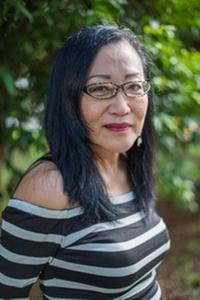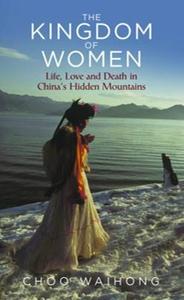
|
|
| photo: Joyce le Mesurier | |
Choo Waihong was a corporate lawyer in Singapore and California before she took early retirement 11 years ago to travel and write. In touring China, she stumbled upon one of the last matrilineal and matriarchal tribes in the world, known as the Mosuo or the Kingdom of Women, where power lies in the hands of women, including decisions related to money, property and the children born to them, and the women live independently of husbands, fathers and brothers, with the grandmother holding court. The Mosuo practice a form of "walking marriage," where women choose their own lovers from men within the tribe but are beholden to none. The tribe's stories are lovingly recounted in Choo Waihong's first book, The Kingdom of Women: Life, Love and Death in China's Hidden Mountains (I.B. Tauris).
On your nightstand now:
As I continue to pursue my deep interest in Asian history, I am in the middle of Empress Dowager Cixi: The Concubine Who Launched Modern China by Jung Chang, about the powerful woman behind the throne who presided over the turbulent times in the dying years of Imperial China. I also started From the Ruins of Empire by Pankaj Mishra, a history of the Asian thinkers and leaders who rose up against two centuries of Western colonialism in China, India and the Middle East.
Favorite book when you were a child:
Enid Blyton's Famous Five series, which were a fun way to learn English while avidly following the many adventures of five imaginative teenagers chasing clues to mysteries real or imagined.
Your top five authors:
For sheer pleasure in reading the beautiful language in their books, my all-time favorite writers are John Steinbeck (Of Mice and Men and Travels with Charlie); the prolific Jan Morris, English travel writer extraordinaire, with her portraits of cities around the world; and Isabelle Allende, especially her novel The House of the Spirits.
In the genre of travel and historical fiction books, Laurens van der Post, who was born in Africa and lived in England, is my top choice. He brought to life many stories on Africa and the Bushmen of the Kalahari. Next up is Conn Iggulden, for his remarkable historical fiction series on Genghis Khan and the Mongol Empire.
Book you've faked reading:
The Great Gatsby by F. Scott Fitzgerald. Thank goodness I can still recall scenes from the movie when the dinner topic revolves around the book. Book you're an evangelist for:
Book you're an evangelist for:
The Wolf Totem by a Chinese author, Jiang Rong (pseudonym), about life among the traditional Mongolian nomads on the steppe in China during the Cultural Revolution. The book vividly juxtaposes Mongolian tribal beliefs against mainstream Han Chinese agrarian customs, and brilliantly mixes politics and the clash of civilizations.
Book you've bought for the cover:
Forgive me for being partial, but both the front cover and the back cover of my book The Kingdom of Women are beautiful. The front cover depicts a Mosuo woman striding confidently in her matriarchal world on the shore of picturesque Lugu Lake in China, and the back cover is my picture of the Mountain Goddess worshipped by her Mosuo tribe.
Book you hid from your parents:
The Story of O by Pauline Réage (pseudonym) but really Anne Desclos, a soft porn tale of sadism and masochism.
Book that changed your life:
I read The Women's Room by Marilyn French on becoming 21, and it opened my mind to a later literary diet of books written by female writers on what it means to be a woman in the world.
Favorite line from a book:
It's difficult to pinpoint any particular favorite line from a single book, but every first sentence of each book fascinates me and ignites my imagination on how each author tries to capture the attention of the reader instantly with the promise of the reading treasure to come. Never buy a book if you are not excited by the first sentence, is my advice.
Five books you'll never part with:
To Kill a Mockingbird by Harper Lee, one of the greatest American books ever written.
The Handmaid's Tale by Margaret Atwood, a strong indictment against man's suppression of women in the name of religion.
Eldest Son: Zhou Enlai and the Making of Modern China, 1898-1976 by Han Suyin, a favorite author of mine, about the great Chinese statesman.
The Return of the Dancing Master in the Inspector Kurt Wallander series by Swedish novelist Henning Mankell, which introduced me to a whole new word of Scandi detective stories.
The Temple of the Golden Pavilion by the great Japanese novelist Yukio Mishima.
Book you most want to read again for the first time:
Love in the Time of Cholera, a mesmerizing story of love beautifully written by Gabriel García Márquez.

